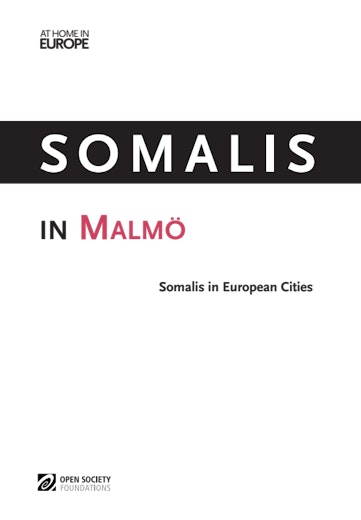New research published today by the Open Society Foundations reveals Somali integration in Malmö faces significant challenges, particularly when it comes to employment.
According to Somalis in Malmö, many Somali respondents like living in Malmo and believe there is greater religious tolerance than elsewhere in Sweden. However, there is insufficient dialogue between the authorities in Malmo and the Somali community leading to a lack of information about employment opportunities. The report also notes that more needs to be done to inform and include Somalis and other migrant communities in efforts to curb discrimination.
Nazia Hussain, director of the Open Society Foundations’ At Home in Europe project, said:
Unemployment creates many problems in the lives of Somalis—both first and subsequent generations—and limits their opportunities for integration. It results in low income, low self-esteem, isolation, and few opportunities to practice the Swedish language.
Coming from a country with a very different economic and social structure has left many Somalis at a disadvantage when entering the job market in Sweden. More needs to be done by institutions, including the local authorities and the Somali communities to help rectify this gap in education and skills, in order to overcome the barriers facing people attempting to enter the labor market.
The report recommends that the City of Malmö should work with businesses and Somali and other migrant communities to provide information, transparency, and accountability when it comes to accessing the labor market. The report also recommends that the City of Malmo work together with personnel development services, in the context of institutions, and encourage business organizations to review current equality and diversity practices, and improve or develop standards, guidance and training programs to help avoid discrimination in employment.
In Malmö only 21 percent of Somalis are employed, this is despite the vast majority (70 percent) being between the ages of 16 and 40. One of the major barriers to employment is high requirements of fluency in Swedish, which, in part due to problems with integration, Somalis struggle to attain.
The report recommends that the City of Malmö and private sector businesses should work with Somali organizations to consider reducing language requirements for some jobs and subsidizing language support in the workplace as a means of increasing employment and employability.
Andreas Schönström, Deputy Mayor with Responsibility for Employment, Secondary and Adult Education, Malmö City Council, said:
Malmo city council has long been aware of the difficulties faced by Somalis in the Swedish labour market but this report offers us new insights about their situation. It also proposes tools and extends knowledge to better adjust our efforts in integrating Somali citizens and residents. I am convinced we are on the right track here in Malmo, but believe there is room to improve our policies on social investment to better address the conditions and experiences of Somalis.
The report also recommends that the city of Malmo further develop ways to challenge discrimination and improve methods to share information about antidiscrimination programs and policies. Sweden, according to the Migrant Integration Policy Index (MIPEX), has the best integration policy in the world and ranks third for the best anti-discrimination policies. However, antidiscrimination policies are poorly communicated to Somalis and other migrant communities. This leaves communities feeling even more isolated and creates the sense that they have nowhere to turn when faced with discrimination.
Notes
-
Somalis in Malmö is the third report to be released in the Somalis in European Cities series by the At Home in Europe project of the Open Society Initiative for Europe, Open Society Foundations.
-
The At Home in Europe project works to advance equality for groups that are excluded from mainstream civic, political, and cultural life in a changing Europe. At Home in Europe advocates for change with grassroots civil society groups, policy makers, practitioners and residents in 17 cities in Western Europe.
-
The report is accompanied by Meet the Somalis, an illustration series of Somali migrant experiences from 7 European cities.
-
A full Swedish translation of the report will be available in due course.
Download
-
Press Release (Swedish) (489.08 Kb pdf file)
Download the press release in Swedish.
